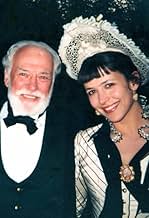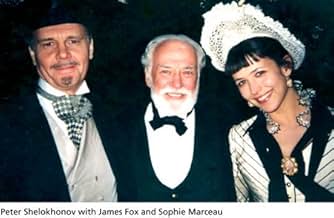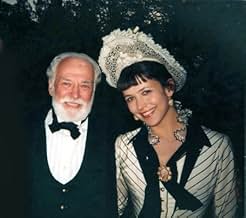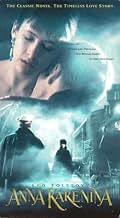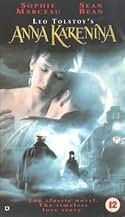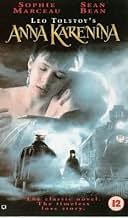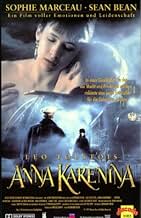NOTE IMDb
6,3/10
6,3 k
MA NOTE
Anna (Marceau) est une épouse et une mère qui a une liaison avec le beau comte Vronsky. D'après le roman de Tolstoï.Anna (Marceau) est une épouse et une mère qui a une liaison avec le beau comte Vronsky. D'après le roman de Tolstoï.Anna (Marceau) est une épouse et une mère qui a une liaison avec le beau comte Vronsky. D'après le roman de Tolstoï.
- Réalisation
- Scénario
- Casting principal
Petr Shelokhonov
- Kapitonich, Chief Butler
- (as Pyotr Sholokhov)
Avis à la une
Of all the versions of the Tolstoy novel which I have seen (two with Greta Garbo, the deplorable one with Vivien Leigh, another with Jacqueline Bisset), this is the one that really reflects the scope and social observation of the book. The careful direction and art direction, the St.Petersburg backgrounds, as well as the exquisite cinematography, make this movie a real feast for the eyes, with magnificent plastic compositions and lighting in every shot. The abused Tchaikovsky music was used discreetly. Sophie Marceau plays a very young Anna, and makes her credible all the time. Sean Bean and James Fox, as Vronsky and Karenin, are admirable. And even if the screen play by director Bernard Rose is a little too literary, the complete story was told, and the result was the best Anna Karenina the screen has offered.
Now, perhaps I'm out of my element writing a review for "Anna Karenina" without having read the book, but I shall do so regardless. Many criticised this film because it did not follow the book, or omitted one thing or another. That is all well and good, but what feature-length film *can* capture the entire scope of a novel the size of "Anna Karenina"? I watched the older version with Greta Garbo and--though I cannot imagine why--it never truly caught my attention. This version, however, captured me from the start. And I am usually the first one to complain about what is wrong with a remake in comparison to the old version. A paradox, indeed.
This film first caught my eye because of Sophie Marceau. I admire her immensely as an actress, having seen her in several films, both French and English. Then, I recognised Bernard Rose as the director of "Immortal Beloved", a film I had enjoyed some months before, mostly due to a magnificent performance by Gary Oldman, some of the most glorious music caught on film.
The music, I can probably cite as one of the main reasons I loved this film. I can think of no better love theme for a doomed romance like that of Anna and Vronsky, than the first movement of Tchaikovsky's Sixth Symphony. The use of "Swan Lake" at various points was also wonderful, and the interplay during the scene at the ballet held me mesmerised. Vronsky speaks of Anna being trapped in her marriage as the Prince seeks to capture the Swan Queen. Perhaps I'm just rambling, but somehow that connected.
On the whole, the performances were good. Sophie Marceau was perfectly believable as Anna, and some of her scenes sent chills down my spine, though my favourite performance of hers still has to be "Firelight". Sean Bean had me worried for a few seconds, with a mannered reading or two, but improved quickly as the film progressed. Another reviewer pointed out that Vronsky was meant to be a shallower character than Anna, and now that I think back on it, I believe that is very true, and that Sean Bean's performance reflected this superficiality. Mia Kirshner was adequate--I didn't particularly care for her--but Alfred Molina and James Fox both gave fine performances (a standout for me was when Anna wrote Karenin from Italy and Karenin wavered before refusing to let her see Sergei).
However, equally on par with the actors, was the setting. Very few films, I have to admit, can look *so* beautiful. Especially the ballroom scene, with the seemingly neverending hallway of gilded doors, the location photography was spectacular. The costumes were stunning, and the cinematography made even snow seem alive. Even if you do not care for the story or the acting, this is a film to watch for visuals.
Thus, I believe that this film deserves far more credit than it received. I, personally, loved it for varied reasons, but I have to admit that what truly captured me was the way Bernard Rose can take an average script and transform it into a beautiful film using visuals and music. Very few directors take the time to put music and image together if they use classical scores (my favourites would be David Lean and John Boorman), and I believe Bernard Rose should be watched in the future. I should love to see what he would do with a film set in late 19th century Italy, when opera was at its height!
***1/2 out of ****
This film first caught my eye because of Sophie Marceau. I admire her immensely as an actress, having seen her in several films, both French and English. Then, I recognised Bernard Rose as the director of "Immortal Beloved", a film I had enjoyed some months before, mostly due to a magnificent performance by Gary Oldman, some of the most glorious music caught on film.
The music, I can probably cite as one of the main reasons I loved this film. I can think of no better love theme for a doomed romance like that of Anna and Vronsky, than the first movement of Tchaikovsky's Sixth Symphony. The use of "Swan Lake" at various points was also wonderful, and the interplay during the scene at the ballet held me mesmerised. Vronsky speaks of Anna being trapped in her marriage as the Prince seeks to capture the Swan Queen. Perhaps I'm just rambling, but somehow that connected.
On the whole, the performances were good. Sophie Marceau was perfectly believable as Anna, and some of her scenes sent chills down my spine, though my favourite performance of hers still has to be "Firelight". Sean Bean had me worried for a few seconds, with a mannered reading or two, but improved quickly as the film progressed. Another reviewer pointed out that Vronsky was meant to be a shallower character than Anna, and now that I think back on it, I believe that is very true, and that Sean Bean's performance reflected this superficiality. Mia Kirshner was adequate--I didn't particularly care for her--but Alfred Molina and James Fox both gave fine performances (a standout for me was when Anna wrote Karenin from Italy and Karenin wavered before refusing to let her see Sergei).
However, equally on par with the actors, was the setting. Very few films, I have to admit, can look *so* beautiful. Especially the ballroom scene, with the seemingly neverending hallway of gilded doors, the location photography was spectacular. The costumes were stunning, and the cinematography made even snow seem alive. Even if you do not care for the story or the acting, this is a film to watch for visuals.
Thus, I believe that this film deserves far more credit than it received. I, personally, loved it for varied reasons, but I have to admit that what truly captured me was the way Bernard Rose can take an average script and transform it into a beautiful film using visuals and music. Very few directors take the time to put music and image together if they use classical scores (my favourites would be David Lean and John Boorman), and I believe Bernard Rose should be watched in the future. I should love to see what he would do with a film set in late 19th century Italy, when opera was at its height!
***1/2 out of ****
Visually, this film is gorgeous. Sophie Marceau is perfect as Anna and Alfred Molina also shines. Sean Bean, known for finding the humanity in the worst of characters, is the most likeable, sympathetic and attractive Vronsky I have seen. He does not portray the transformation of the selfish, spoilt, wealthy and aristocratic mother's darling into a deeply remorseful, more mature individual who learns that there is a price to pay for taking whatever you want and you had better consider the price worth it. A pity as the contrasting story of Levin (Alfred Molina) and his unselfish devotion to Princess Kitty requires that the point be made. You reap what you sow. Similarly, James Fox is too tolerant and long-suffering as Karenin. Tostoy's Karenin is a self-important bureaucrat who disguises his revenge on Anna as piety. HOWEVER...maybe not be accurate Tolstoy but the sheer niceness of all the characters makes one care far more when tragedy strikes than I ever did when I read the book. Gorgeous music also.
Which is entirely to be expected with a novel the size and complexity, I'm told, of Leo Tolstoy's "Anna Karenina", which I have not read.
I will blushingly admit that I first viewed this film mostly because of Sean Bean's presence. I found him a superb actor in the Lord of the Rings, and hoped to find more in his other works.
Truthfully, his portrayal of Vronsky feels somewhat light in this film; I attribute this to three factors: the severe compression of the novel (as happens with all film adaptations), the actual nature of the character itself, and the slightly boring task of playing mostly passion. Unlike other viewers, I found it very difficult to sympathize with Vronsky, and his repentance hollow. My heart melted somewhat, though, during his flashback to Karenina's corpse at the railway, and his brimming eyes as the train pulled away. Redeemed slightly at the very last moment.
Sophie Marceau is stunning as Anna Karenina; I found her enchanting from the start. Marceau plays the title lady with dignity, elegance, and grace; in her more intimate and emotional moments, she portrays Karenina's motherly and passionate sides with skill.
The inevitable flaws of adaptation show through in this film; there are numerous location changes, and multiple "quick" passages of time. Every event feels strung together by a thread, which they likely are, chosen for their narrative value. Yet it doesn't work, as the overall result lacks a palatable sense of cohesion. The love story of Karenina and Vronsky feels chopped and rushed, as does the tale of Levin and his Kitty -- which is too bad, since they are both the anchor narratives. The contrast of the two, however, plays well, and reminds me of the romances in Michael Ondaatje's "English Patient" (I'm well aware Tolstory precedes Ondaatje).
The greatest features of "Anna Karenina" lie in the atmosphere. Despite the out-of-place original accents of the actors, Russian is spoken skilfully, and the chosen music is beautiful and appropriately evocative of an older, grander time. and the lovely landscapes of Russia play a beautiful role in the background. The costumes and sets are breathtaking; the highlight is surely the ballroom scene, when all are attired for an evening "out" and Tchaikovsky's Swan Lake Waltz is playing.
While an excellent effort, "Anna Karenina" eventually feels like what it is: a cinematic adaptation of a novel.
I'd give it a 8 out of 10.
I will blushingly admit that I first viewed this film mostly because of Sean Bean's presence. I found him a superb actor in the Lord of the Rings, and hoped to find more in his other works.
Truthfully, his portrayal of Vronsky feels somewhat light in this film; I attribute this to three factors: the severe compression of the novel (as happens with all film adaptations), the actual nature of the character itself, and the slightly boring task of playing mostly passion. Unlike other viewers, I found it very difficult to sympathize with Vronsky, and his repentance hollow. My heart melted somewhat, though, during his flashback to Karenina's corpse at the railway, and his brimming eyes as the train pulled away. Redeemed slightly at the very last moment.
Sophie Marceau is stunning as Anna Karenina; I found her enchanting from the start. Marceau plays the title lady with dignity, elegance, and grace; in her more intimate and emotional moments, she portrays Karenina's motherly and passionate sides with skill.
The inevitable flaws of adaptation show through in this film; there are numerous location changes, and multiple "quick" passages of time. Every event feels strung together by a thread, which they likely are, chosen for their narrative value. Yet it doesn't work, as the overall result lacks a palatable sense of cohesion. The love story of Karenina and Vronsky feels chopped and rushed, as does the tale of Levin and his Kitty -- which is too bad, since they are both the anchor narratives. The contrast of the two, however, plays well, and reminds me of the romances in Michael Ondaatje's "English Patient" (I'm well aware Tolstory precedes Ondaatje).
The greatest features of "Anna Karenina" lie in the atmosphere. Despite the out-of-place original accents of the actors, Russian is spoken skilfully, and the chosen music is beautiful and appropriately evocative of an older, grander time. and the lovely landscapes of Russia play a beautiful role in the background. The costumes and sets are breathtaking; the highlight is surely the ballroom scene, when all are attired for an evening "out" and Tchaikovsky's Swan Lake Waltz is playing.
While an excellent effort, "Anna Karenina" eventually feels like what it is: a cinematic adaptation of a novel.
I'd give it a 8 out of 10.
To be honest, I have not read this book. I have heard that it was a classic and all those other things that people say about his book, but really had no idea what the story is about. Actually, the main reason that I watched this movie, was that Sean Bean was in it(I had previously seen him in Lord of the Rings, and really enjoyed him). I was surprised to find this story so engaging. I thought that he was amazing in this movie, very charming. He just has this intangible quality that always has me rooting for him.
This is the first movie that I have ever seen Sophie Marceau in(playing Anna Karenina) and I found that she portrays Anna with a delicate grace, that makes you understand Vronsky's(Bean) dogged pursuit of her.
True, I have to say that I found the end a little disappointing, and heart-wrenching. Sean Bean shines at the end of the movie, I think he really shows well just how much Vronsky finally realizes he has lost.
This is the first movie that I have ever seen Sophie Marceau in(playing Anna Karenina) and I found that she portrays Anna with a delicate grace, that makes you understand Vronsky's(Bean) dogged pursuit of her.
True, I have to say that I found the end a little disappointing, and heart-wrenching. Sean Bean shines at the end of the movie, I think he really shows well just how much Vronsky finally realizes he has lost.
Le saviez-vous
- AnecdotesThis was the first western production of "Anna Karenina" to be filmed in Russia (St. Petersburg).
- GaffesDuring the movie, title cards inform the viewer that the story arch unfolds in the years 1880 to 1882 - yet at the end of the movie Vronsky leaves to fight in the Russo-Turkish war of 1877- 1878.
- Citations
Anna Karenina: What are you doing here?
Vronsky: You know that I have come to be where you are. I cannot help myself.
- ConnexionsReferenced in 13 posterunek: Kalambury filmowe (1998)
- Bandes originalesSymphony No. 6 in B Minor, op. 74 (Pathetique)
Written by Pyotr Ilyich Tchaikovsky (as Peter Ilyich Tchaikovsky)
Performed by The St. Petersburg Philharmonic Orchestra
Conducted by Georg Solti (as Sir Georg Solti)
Courtesy of Icon Records and London Records
Meilleurs choix
Connectez-vous pour évaluer et suivre la liste de favoris afin de recevoir des recommandations personnalisées
- How long is Anna Karenina?Alimenté par Alexa
Détails
- Date de sortie
- Pays d’origine
- Sites officiels
- Langues
- Aussi connu sous le nom de
- Anna Karenina
- Lieux de tournage
- Sociétés de production
- Voir plus de crédits d'entreprise sur IMDbPro
Box-office
- Budget
- 35 000 000 $US (estimé)
- Montant brut aux États-Unis et au Canada
- 858 553 $US
- Week-end de sortie aux États-Unis et au Canada
- 75 268 $US
- 6 avr. 1997
- Montant brut mondial
- 858 553 $US
- Durée1 heure 48 minutes
- Couleur
- Mixage
- Rapport de forme
- 2.35 : 1
Contribuer à cette page
Suggérer une modification ou ajouter du contenu manquant

Lacune principale
By what name was Anna Karénine (1997) officially released in India in English?
Répondre

